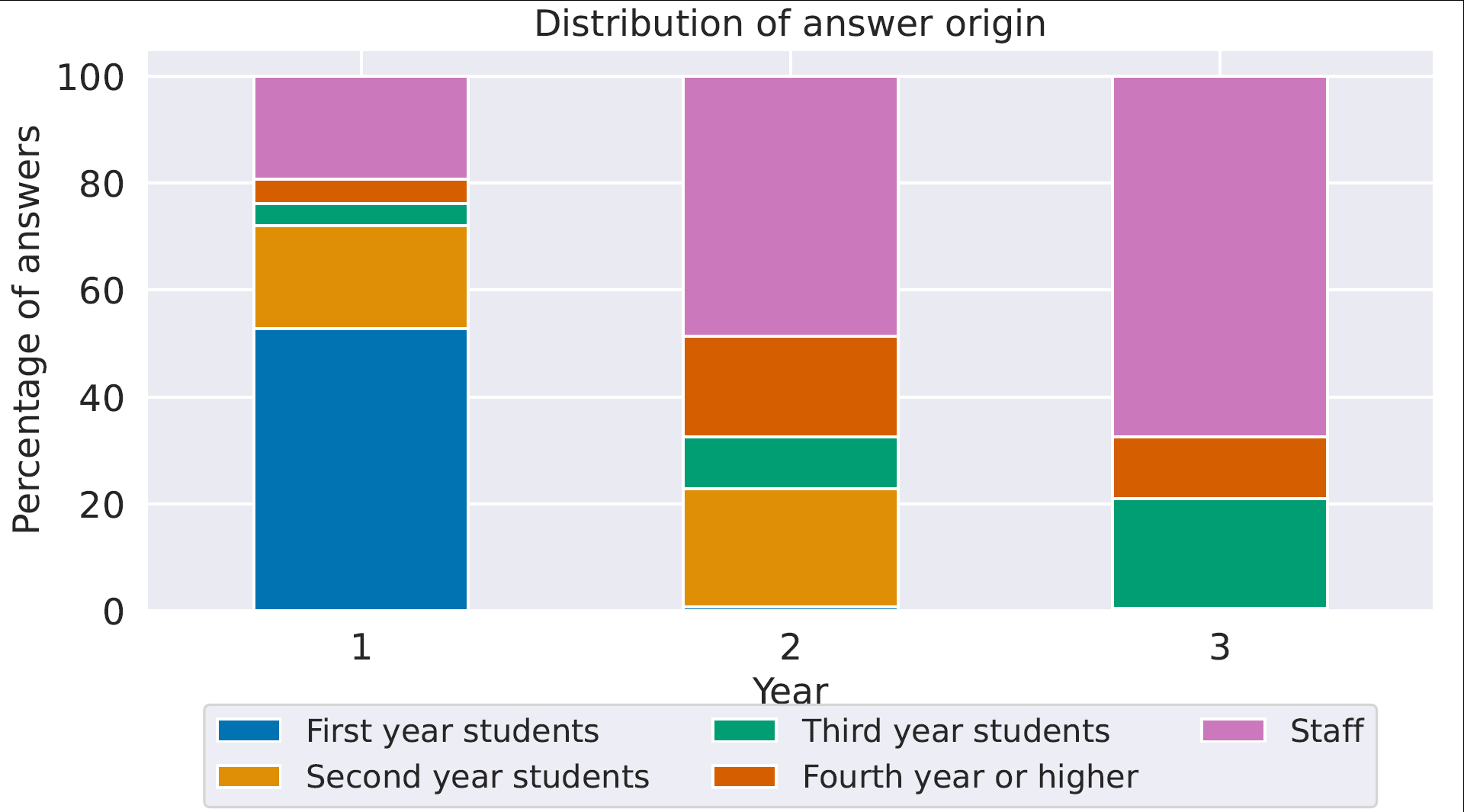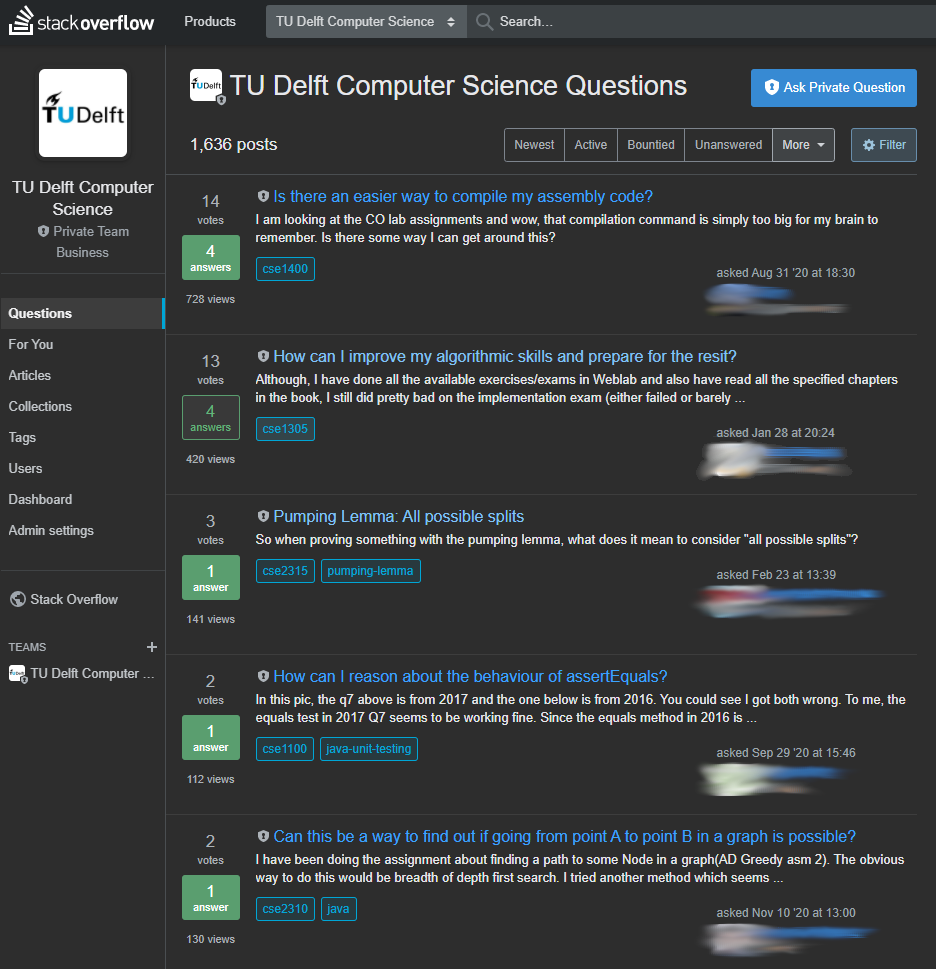Opening education by stimulating students to share knowledge
Open Education Week 2022 | Blogpost by Stefan Hugtenburg
“A blogpost for the open education week? But I’m not involved in creating open educational resources!” (Well, not for this poject at least...).That is probably a fairly close summary to my response when I was asked to write something about our Stack Overflow platform for this open education week. Yet here I am, writing a post after all. So, allow me to give you some context. Or if you’d rather skip that, the oneline summary: A gamified knowledge sharing platform in Computer Science & Engineering has proven very useful over the past 18 months.
In terms of context, let’s start with introducing myself. Hi! I’m Stefan, a lecturer in Computer Science & Engineering. As a member of the Computer Science & Engineering Teaching Team, I am part of a team supporting the university in providing high-quality education. An amazing and inspiring job in and of itself, but for Computer Science some new challenges were thrown our way when I joined the university as a lecturer in 2017. Our student population grew from 110 first years in 2011 (when I started as a bachelor student), to 480 in 2017, and peaked at 880 in 2018. Since then it has stabilised at 500 a year thanks to a numerus fixus.
Unsurprisingly, when you have more students, you also get more questions. Students were encouraged to ask these on the Brightspace fora, but unfortunately seemed hesitant to answer questions from their peers. In other words, they were happy to consume information shared there, but hesitant to produce. Which brings us back to the existence of this blog post. As the university of Texas Arlington puts it: “Open pedagogy is the practice of engaging with students as creators of information rather than simply consumers of it.” Or as our own university puts it: “Enabling students to feel more involved in their education by helping them [. . . ], add value to the knowledge domain in which they study, engage in more active ways with their course materials [. . . ]”. And as it so happens, that is exactly what we’re doing!
In the field of computer science, there is one website that every programmer has heard of and is likely to visit frequently: Stack Overflow. It is a gamified question & answering platform, on which thousands of people ask questions every day, which are then answered by strangers on the internet for no other incentive than virtual internet points. If you are curious, it might be nice to know that there are other sites from the same overarching organisation (Stack Exchange), for other fields as well. Mathematicians, Chemists, Bicycle enthusiasts, and Musicians can all seek help (or provide it!) on similar platforms. On these sites it seems, that there re plenty of people willing to help out others. So why not try that in our education? (Fun fact: as a computer scientist, I of course asked the people on Stack Overflow whether or not we should try this.)
What are we doing exactly?
Funded by a SURF grant, we set out to use a private instance of Stack Overflow in our education. But unlike the Brightspace discussions which are for a single course and are abandoned after one iteration of the course, this instance is open for all our bachelor, master, and minor students involved in studying computer science. Our goals were (and still are):
- Building a persistent knowledge base open to all students.
- Creating a community of learners by stimulating cross-cohort Q&A. Having second year students help out the freshers by answering their questions!
- Lowering staff workload by leveraging the large student popilation to rdeuce our worklaod for a change.
At its core, Stack Overflow is a question & answering platform. When visiting the site, users are confronted with an overview of the latest questions asked, tagged with the courses and topics they relate to. The image below gives an example of what that might look like.
In addition to the cross-cohort opportunities and the growing knowledge base, Stack Overflow also has some gamified elements stimulating students to not only ask, but also answer questions. Some of our users took to this, and in my interviews with our top contributors I was told: “I just wanted to beat [other student] on the leader boards, but now that I have, I’ve just stuck around for fun”. Another even mentioned that “[Lecturer of the course] was quite the competition! I have to be very fast to get in before them.” Since the start, our top 20 contributors consists of 15 students and only 5 lecturers (I’m proud to report I’m one of them ;) And so is the lecturer referred to by the student). In addition to gaining “reputation” points, students can earn badges for their contributions. My newest badge at the time of writing is: “Booster” for “Share a link to a post later visited by 300 unique IP addresses.” I guess that’s one of the benefits of being a lecturer :)
So does it work?
Since September 2020, we have been using this private Stack Overflow instance, gradually expanding the cohorts of students using the platform. Last summer we summarised our findings in a poster submission to SIGCSE 2022 (PDF available here), highlighting how in this past year our 1600 users had been using our platform. We observed that students asked 64% more questions on Stack Overflow than in the previous year on Brightspace, and that the percentage of questions answered by fellow students grew by 72%. In the figure below, you can see the distribution of who answered the questions asked about our first year, second year, and third year courses. As you can see, the majority of the first year questions were answered by fellow students, with many answers originating from first year students, but also a fair number from higher years. With the addition of our master students to the platform this year we have now reached 2900 users and we hope that this year also the third year courses will see more answers come in from students rather than staff!

At the time of writing (the start of March), another 2000 questions have been submitted to the platform. Although a full-fledged analysis of this second year is still to be done, there are certainly more positive signals surfacing. Some of the questions from last year now have hundreds (or even more than a thousand) views, and at least for my courses I’ve seen hardly any duplicates of questions that were already answered on the platform last year. Not to mention that more of our lecturers have adopted Stack Overflow in their master courses, after enjoying the experience for their bachelor courses.
So where does that leave us? Well, so far the responses we’ve gathered on the use of Stack Overflow have been largely positive and we see positive trends in how students use the platform. In short, we are well on our way to creating a lasting knowledge base created and curated by our students!
